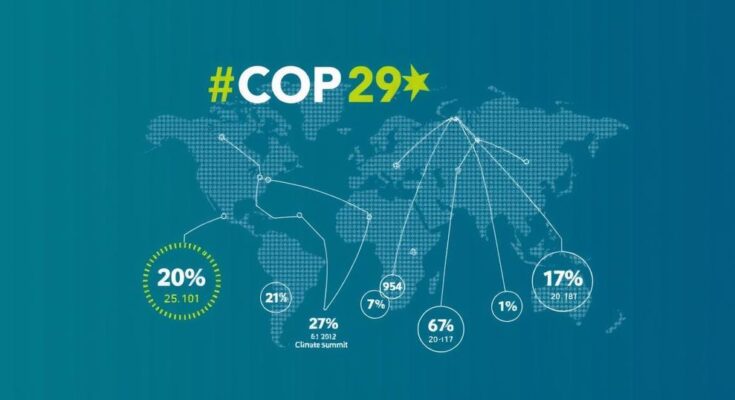COP29 in Baku produced an agreement for $300 billion in annual climate finance by 2035, deemed insufficient by many developing nations. Trump’s election dampened U.S. contributions. A carbon credit system was established while concerns over rising emissions persist. Developing nations sought discussions on trade barriers affecting climate efforts, and the influence of fossil fuel interests was evident as the summit failed to advance commitments away from fossil fuels.
The recent COP29 climate summit in Baku, Azerbaijan, underscored the ongoing challenges in the global pursuit of climate finance. After extensive negotiations, participants agreed on a target of $300 billion annually for climate finance by 2035; however, many developing nations expressed concern that this figure is insufficient, especially given the pressing need for immediate action against climate change. The lengthy discussions heightened awareness regarding the urgency for enhanced financial support to facilitate the transition to clean energy.
The election of Donald Trump as president of the United States significantly affected discussions at COP29, as he has publicly dismissed climate change and pledged to withdraw the U.S. from international climate agreements. This development dampened the summit’s atmosphere, as the U.S. has been a substantial historical contributor to global greenhouse gas emissions, and its reluctance to engage further complicates international efforts to address climate change.
In a positive turn, COP29 reached a consensus to establish a carbon credit system, allowing countries to trade carbon credits. This framework aims to attract investments into climate-friendly initiatives, albeit further details on implementation remain unresolved. Nevertheless, there is cautious optimism that this development could facilitate increased funding for climate projects.
Despite these negotiations, concerns persist regarding the effectiveness of the COP process, particularly with rising greenhouse gas emissions and global temperature increases. Extreme weather events have become more frequent and severe, illuminating the inadequacies of current progress towards climate goals and the urgent need for decisive action.
Trade dynamics came under scrutiny as developing nations advocated for discussions on climate-related trade barriers that inhibit their green investments. The proposed carbon border tax in Europe and the looming threat of U.S. tariffs posed significant challenges to global cooperative efforts in addressing climate change. Subsequently, the UN climate body agreed to address trade issues in future summits.
Finally, COP29 was noteworthy for its venue in a fossil fuel-rich country. Despite previous pledges to move away from fossil fuels, the summit failed to outline actionable steps towards this goal, leading many observers to question the influence of fossil fuel interests over the negotiations. The lack of robust commitments highlights the complexities facing international climate policies as nations strive for sustainable futures.
The COP29 climate summit represented a critical juncture in global climate policy, aimed at tackling the effects of climate change and promoting sustainable finance. Climate finance has been a major focus for developing nations, which seek increased financial support from wealthier countries to facilitate their transition to renewable energy. This summit followed heated negotiations and signaled ongoing tensions between developed and developing nations regarding responsibility and accountability in climate action. The backdrop of extreme weather events globally underscores the urgency of ambitious commitments and effective international cooperation.
In conclusion, COP29 highlighted the pressing need for increased climate finance and collaborative efforts to combat climate change effectively. The agreement on carbon credits may provide a stepping stone toward attracting necessary investments. However, political developments, particularly in the United States, hinder collective progress. The necessity for addressing trade barriers and the lingering influence of fossil fuel interests in climate discourse remain concerning. As the climate crisis intensifies, global leaders must prioritize actionable commitments and collaborative solutions.
Original Source: kathmandupost.com




